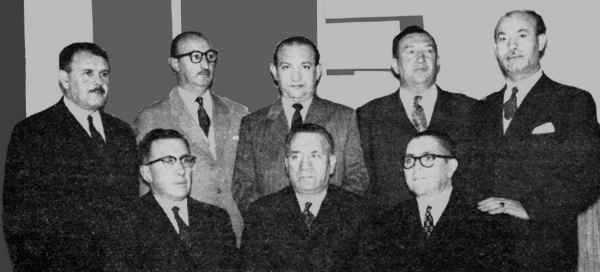 |
From the right, standing: Awraham Icchak Nowinski, Josef Dojf, Chackel Blumenfeld, Chaim Szana, Icchak Finkelsztejn
|
|
[Page 303]
Ostrolenkans in Argentina
The immigration of Ostrolenkans to Argentina began in the twentieth century, in the '20s. Jews left their homes, mainly out of fear of a new world war. Some wanted to encounter new continents with a new way of life, to escape the difficult, monotonous daily life of a small town and seek their fortune in the wide
[Page 304]
world. Ostrolenkans also arrived here with the same intentions. The dream was very beautiful, until their eyes were opened to gray reality and the fact that here, too, they must roll up their sleeves and seek a livelihood.
In the early years, it was hard to find even a day's work. When an advertisement appeared in the newspaper for a worker, one had to get up at five in the morning and stand on a long life at the advertiser's office. Things went on this way for years. Very few were among the fortunate ones who found permanent work. Many workmen were forced to retrain professionally to survive. They became peddlers, selling door to door, carrying a bundle of merchandise on their backs, knocking on doors, hawking their wares in a loud voice. Only some could do this; most gave up. Both the physical and spiritual crisis deepened more and more.
Under these difficult conditions, there was almost no contact between Ostrolenkans. Each was occupied with matters of everyday livelihood. Only in 1945, when the Allies landed a death blow to Hitler's forces and the tragic picture of the destruction of six million Jews was fully revealed, news reached us from Ostrolenkan survivors, with desperate requests for urgent assistance. Only then did our townspeople in Argentina begin to unite, so that, with unified strength, they could ease the survivors' suffering to a small extent. We held a general assembly of Ostrolenkans in Buenos Aires and the area. For all intents and purposes, this was the first contact of our townspeople in Argentina. Everyone was ready to help. We established a committee to contact the survivors in Europe; we sent bundles of food and clothing to Poland. Professionals – tailors and shoemakers – voluntarily sewed clothing and shoes for the survivors, instead of buying ready-made articles at exorbitant prices. Full crates were sent to Europe. Our committee also participated in the life of Argentinean Jewry, and supported various organizations. We were a link in the long chain of our public and social life in Argentina.
Later, the first survivors from Ostrolenka began to arrive, coming to their families in Argentina: the three Holcman sisters came to their brothers, two of them with their husbands and the third unmarried; the son of Chackel the Melamed, Szaje Lazer, with his wife; the granddaughter of Awremcze the Shoemaker with her husband; Sara Grynszpan from Kaczyny with her husband; and Perkal. In their honor, we organized a party in the big hall of the Organization of the Jewish Community of Lomza. We heard shocking testimonies; however, the very fact of their arrival was a holiday and a joy for us. We held often gatherings like these, reminiscing about our past lives in Ostrolenka. With trembling hearts, we mentioned our dear ones and family members who had been murdered, and wished for prosperity and growth for the young State of Israel, established as a comfort for our great loss.
In the last years, for various social reasons, our organization was not so active. This led to loneliness and estrangement among the families of our townspeople. But the wonderful charisma of the effort of the Organization of the Jewish Community of Ostrolenka in Israel to publish a “Yizkor” book, memorializing our community which was destroyed in the Holocaust, completely changed our organization's situation. It aroused all of us to new activity, spurred us to gather material for the book and to contact Ostrolenkans in Israel and other countries. We will remember and never forget the holy victims and the great destruction of our community in Ostrolenka.
[Page 305]
|
|
From the right, standing: Awraham Icchak Nowinski, Josef Dojf, Chackel Blumenfeld, Chaim Szana, Icchak Finkelsztejn |
|
|
|
|
JewishGen, Inc. makes no representations regarding the accuracy of
the translation. The reader may wish to refer to the original material
for verification.
JewishGen is not responsible for inaccuracies or omissions in the original work and cannot rewrite or edit the text to correct inaccuracies and/or omissions.
Our mission is to produce a translation of the original work and we cannot verify the accuracy of statements or alter facts cited.
 Ostrołęka, Poland
Ostrołęka, Poland
 Yizkor Book Project
Yizkor Book Project
 JewishGen Home Page
JewishGen Home Page
Copyright © 1999-2024 by JewishGen, Inc.
Updated 25 Feb 2012 by LA